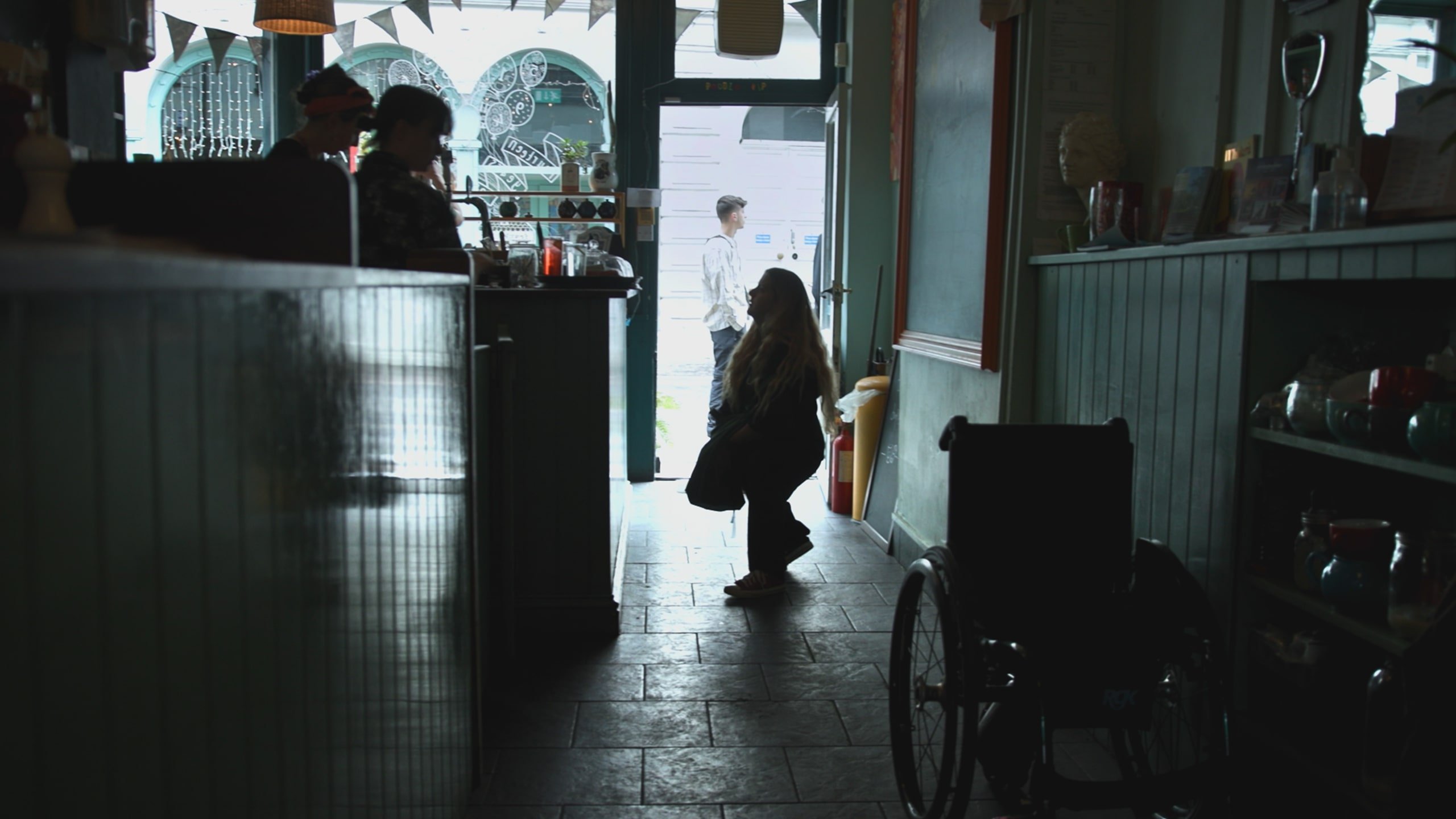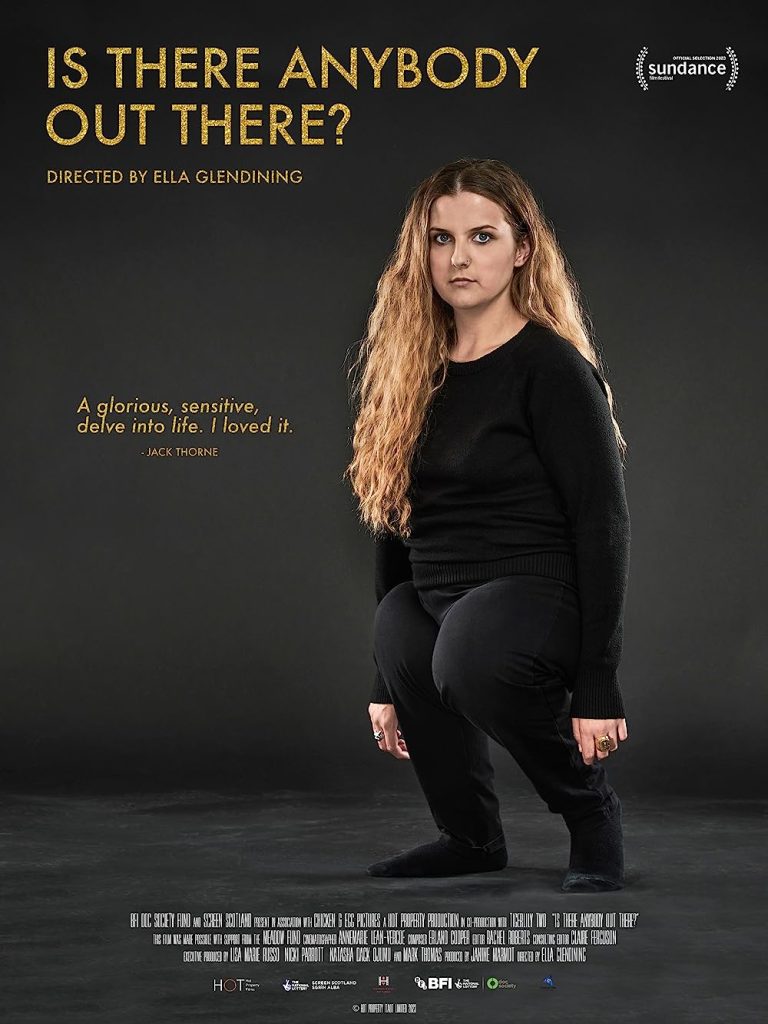Is There Anybody Out There? screens at the Sydney Film Festival on June 12 and 15.
The first thing documentarian Ella Glendining does is to perform a dance for the camera. It’s her way of saying “This is my body, take a good look.” It’s also just a person dancing. What is the audience’s reaction? I can guarantee for the non-disabled it will be something along the lines of how brave it is for her to do something that is normal. Dancing is normal. Dancing with a disabled body is going to be considered something else.
Ella Glendining was born with a rare condition which means she was born without hip joints and has very small thigh bones. It is a condition that so few people have that she has decided to devote herself to a search to find people who possibly have something similar, hence the title Is There Anybody Out There? Using social media, she connects with mostly parents of young children who have comparable disabilities. Ella wants to feel less alone, to see herself reflected in someone else, something the non-disabled experience every day.
Ella’s documentary is part visual diary and part interviews with important people in her life. She films herself asking questions of her now-divorced parents. “People ask me why you didn’t have another child after me,” she tells her mother, “They think it’s because you didn’t want to end up with another me.” Ella’s mother doesn’t quite know what to do with this information. For both Ella’s parents their daughter’s disability wasn’t a burden. Young Ella was a joyful child and didn’t start realising her “difference” until she went to school. Ella’s mum simply says she wasn’t in a good place to have another child and she never considered for a moment that Ella existence would be a deterrent. However, in a world where genetic screening is common the idea of having a disabled child provokes anxiety in perspective parents. Something Ella and her partner Scott are about to be.
Feedback Ella was given when making the documentary is that people wanted to see more of Scott. She steadfastly refused. The documentary is not about focussing on the non-disabled and making a “hero” out of them for being with a disabled person. Too often that is a defining narrative. Ella isn’t saying that carers aren’t hardworking – in fact she spends quite a bit of time with the parents of disabled children dealing with their fears and hopes – but Scott is not her carer, he is her partner and soon to be the father of her son, River.
Ella is a bright and informed woman. Her search and pregnancy make her realise that in many ways she has been internalising ableism. When she is told she won’t be able to have a natural birth she is disappointed and then realises that disappointment is part of ableism. Not being able to do what non-disabled people do should never be a point of shame. Her best friend Naomi is autistic, and she is unable to work. The women discuss over glasses of wine how their disabilities differ but have something in common – they both have to fight to find space in the non-disabled world.
It’s honestly blood boiling to hear Ella discuss how she was turned down for a job in a supermarket. Although it was never explicitly stated the company was discriminating against her. Disabled people seem to have only two lenses through which society will view them: as a burden or as an inspiration. Ella profoundly rejects both.
Within Ella’s documentary she gives a potted history of how disabled people have been viewed both in popular culture and the media. Showing Tod Browning’s Freaks, she responds that this was how she was taught she should view herself: as something monstrous. Although film, art, and literature have a reckoning coming to them with disabled representation, nothing is quite as chilling as watching documentaries made in the later twentieth century that show disabled people being forced to conform to non-disabled standards, sometimes through methods that are nothing less than torture. A journalist asks a disabled person working as a volunteer at a special school if she ever wished she’d never been born? Perhaps that seems like an outrageous question that would only be asked in a less enlightened time, but frustratingly it is not.
One of the first people Ella finds in her internet quest is a Florida surgeon Dr Paley whose immediate response to Ella is to suggest bone lengthening surgery. It wasn’t a question Ella was asking. She just wanted to speak to someone who knew people with similar conditions to her own. Eventually she meets the Doctor in person, and it is simply amazing how calm Ella is in his presence. Here is a man who is conducting more modern versions of the surgeries that we saw in the older documentaries. The surgeries are on children who haven’t really learned to give consent about how their bodies are treated.
While there are many instances of anger-inducing behaviours from people, Ella also chooses to focus on the good community she found through her search. There is the gorgeous make-up artist Priscilla, and the Instagram star Ricardo. Both have a serious “cut the bullshit” attitude that echoes Ella’s own. She meets up with parents of kids with similar conditions either virtually or in person. Each parent is agonising over what to do in terms with their child’s future. Is it for the best to get surgery? If their child is in no pain, why should they?
Ella’s journey is nuanced. She is aware that her perspective is not the only one, but her perspective is rooted in living inside an ableist world and trying to deal with not only the external perception of her but the self-perception that is always informed by ableism. She doesn’t condemn those who have taken different approaches, but she does ask why disabled people are told over and over they must be more like non-disabled people to be considered human.
Is There Anybody Out There? is the culmination of many years of work by Ella. By the time she reaches the end of the documentary she realises that perhaps she was looking for the wrong thing, but the experience of searching taught her a lot about herself, especially once she had become a mother and dealt with her own issues of wanting to protect a child. Ella is brash, funny, frustrated, informed, hopeful, and wise. Is There Anybody Out There? is quite simply one of the best first-person documentaries about disability available. If you don’t learn something about your own ableism and buried prejudices, then you haven’t been paying attention. For someone with a disability, it also serves as a wakeup call to consider what pressures you are putting on yourself to fit in in a world that should shape itself more to you and not the other way around.
Director: Ella Glendining




